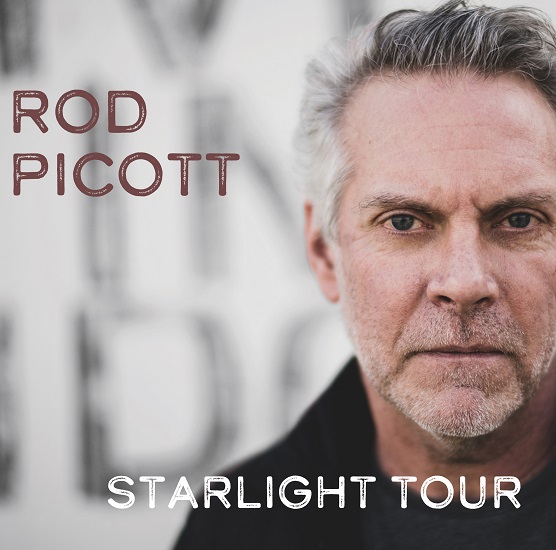
Rod Picott’s a craftsman, working on songs in the same way as carpenter works with wood and a mason works with stone. When he talks about the songs in his notes on the album, he uses images of chisels and carving knives to illustrate the process of knocking a song into shape. If there’s a better songwriting chronicler of rust-belt blue-collar America than Rod Picott, I haven’t heard them; he’s totally authentic and he incorporates his own experiences into his work. By his own admission he’s finding it more difficult to create songs these days after ten albums but he’s now working with other songwriters to create classic songs; the magic is still most definitely there and ‘Starlight Tour’ is probably the most complete Rod Picott album I’ve heard.
The discipline required to complete the album in just five studio days with producer Neilson Hubbard is evident in the arrangement for all ten songs, whether it’s the full-band sound of the blue-collar anthem ‘Digging Ditches’ and moody nostalgic rock of ‘Wasteland’ or the two stripped-back songs that close the album, ‘Pelican Bay’ telling the story of Vietnam veteran and his happiness followed by tragedy and the intimations of mortality in the closing song ‘It’s Time to Let Go of Your Dreams’ with a close-mic vocal backed by acoustic guitar and a very understated muted trumpet solo.
There are references you come to expect on a Rod Picott album; boxing’s one of them. His take on the tragic life of Sonny Liston from 2022’s ‘Paper Hearts and Broken Arrows’ is a classic. Here he builds ‘A Puncher’s Chance’ around a boxing metaphor which he applies to a romantic pursuit; the last thing to go is a boxer’s strength, so there’s always a chance of landing a lucky punch if you’re willing to take enough punishment along the way.
Rod’s songs are firmly grounded in real life; his style is very much audio verité and two of the co-writes demonstrate this in different ways. ‘Homecoming Queen’, written with Amy Speace, tells a familiar story with a more personal twist, while the Nick Nace co-write is an exploration of tales of the Saskatoon Police dumping drunk indigenous people outside the city in winter to die of hypothermia. There’s a terrible economy and clarity in the line “His crime was being, drunk, brown and poor” set against the sparse arrangement of ‘Starlight Tour’ that stops you in your tracks.
If you’ve heard any of Rod’s previous work, you’ll recognise some of the themes here; his interest in boxing, looking through the rear-view at small-town America and his love of its inhabitants. The change in tone with ‘Starlight Tour’ and, to a certain extent, its predecessor ‘Paper Hearts and Broken Arrows’ is that they‘re looking forwards at a road that’s much shorter than the road already travelled. It’s a difficult realisation to come to terms with and it adds a maturity to the album that promotes it from great Rod Picott album to classic singer-songwriter album.
‘Starlight Tour’ is released in the UK on Friday October 20th on Welding Rod Records.
Here’s the lyric video from the album’s opening song, ‘Next Man in Line’:

Every so often, an album comes along that isn’t just a great collection of songs played beautifully; an album that pushes a few personal buttons and maybe touches a few raw nerves as well. Rod Picott’s ‘Paper Hearts and Broken Arrows’ is one of those albums that creates a very personal connection. Maybe it’s an East Coast thing between Maine in the USA and Fife in Scotland; you don’t need to look too hard to see the parallels and ‘Washington County’ paints a picture of an area where genteel resorts sit side by side with poverty-stricken former industrial towns and villages. They’re three thousand miles apart, but it’s the same experience.
Just taking a step to one side for a moment, as music has moved into the digital realm, so have some of the ways of getting it out there and letting people know about it. It’s not so long since review copies arrived as CDs (or vinyl if you want go back a bit further) with an A4 press release, through the letterbox. Now they arrive in your inbox and an artist or PR team can include much more material with no extra distribution costs. Which means that artwork and credits, additional photos and lyric sheets are fairly common now and there’s a relatively recent addition of the artist’s ‘track-by-track’ notes. Reviewers should rely more on their ears and instincts than press releases, but you can sometimes pick up a useful insight into the artist’s vision. In the case of Rod Picott, there’s always something worth reading when he puts fingers to keyboard.
The story behind ‘Valentine’s Day’ on this album is a perfect example. It’s a very honest song, painfully so, that’s stripped back to the raw basics of acoustic guitar and cracked vocal. Rod’s notes tell us that the original recording was a full band version that sounded “wonderful – and completely wrong”, like “an Eagles track with a guy that can’t really sing”; the arrangement was too perfect and in Rod’s words again, “for me, perfect is almost always wrong”. Producer Neilson Hubbard liked the stripped-back version and three takes later it was in the can.
There are a couple of strands that run through the album, Rod’s acceptance of a spell of single life that surfaces in the opening song ‘Lover’, ‘Valentine’s Day’ and ‘Mona Lisa’ where the loneliness exists for creatives even inside a relationship, and the autobiographical songs ‘Lost in the South’ and ‘Mark of Your Father’ which both reference his background and his father with ‘Lost in the South’ using his father as a jumping-off point for Rod’s early experiences in the South, while ‘Mark of Your Father’ explores the complicated nature of father-son relationships using Marvin Gaye as an example of how bad things can really get.
And then there are a few songs taking their inspiration from other areas. The dark and menacing ‘Revenuer’, with its dirty guitars and screaming slide solo is inspired by a Taylor Brown novel and explores that thin line between right and wrong when your choices are limited and times are hard. ‘Frankie Lee’ is an outlaw song where the main character always accepts his ultimate fate as the electric chair and, like a lot of Rod’s more stark songs, wouldn’t sound out of place on The Boss’s ‘Nebraska’ (and I know I’ve made that link before).
Rod’s a fan of boxing and ‘Sonny Liston’ is a song that pulls at some of the threads running through a lot of Rod’s work. Sonny Liston was a complex character, torn between the world he came from and the dubious world of professional boxing and gangland connections that he joined without ever gaining the respect of either. The man who took his world title, Cassius Clay/Muhammad Ali is better remembered now, but the Sonny Liston story is full of loose ends, links to organised crime, drugs, sudden death and astonishing sporting prowess. Rod weaves all of these strands into a powerful and economic narrative with a simple alliterative and assonant chorus: “Two big fists pumping like pistons, nobody punched like Sonny Liston”.
Fourteen albums in, Rod Picott is still pushing at the boundaries of his craft, still looking for ways to create songs that mean something, to him and to his audience. Let’s not use the word ”perfect” to describe ‘Paper Heart and Broken Arrows”; let’s go with an outstanding collection of beautifully-crafted songs delivered by outstanding musicians and a singer whose voice cracks with power and emotion. OK with you?
‘Paper Hearts and Broken Arrows’ is released in the UK on Friday June 10on Welding Rod Records.
No videos yet for songs on the album, but here’s a link to a live performance of the fabulous ‘Rust Belt Fields’:
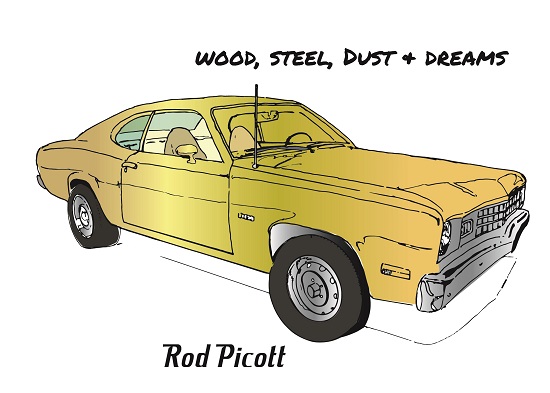
It’s difficult to review a Rod Picott album without mentioning Raymond Carver. There we go, that’s out of the way now, we don’t have to go back to that, valid as it is. “Wood, Steel, Dust + Dreams” is in the category of ‘Great idea; will it actually work?’ (spoiler alert – it will). The great idea was to take the twenty-five songs that Rod had co-written with childhood buddy and long-time collaborator Slaid Cleaves and rework them as a record of their collaboration. And there’s another interesting idea; the two-disc collection will only be available on CD. No, downloads, no streaming; you buy the album directly from Rod and no-one else takes a slice of it. Or, even better, you could go out and catch him on his UK tour (details below) and put some money in his hand personally in exchange for two CDs. It’s a nice way to get your music fix.
The title of the album sums things up neatly (although ‘rust’ could have featured as well). This album is packed with American blue-collar songs; we’re not taking Manhattan or Berlin, we’re dealing with people doing back-breaking manual labour in the rust belt and busting out at the weekend, drinking, racing cars or gambling and you can feel the authenticity running through every song. Running to twenty-five songs over two CDs, it’s a lot of songs. As our Northern reporter, Steve Jenner, used to say about “Sandinista”, you need a packed lunch for that one. There’s no filler; they’re all great songs and the list of musicians on the album is very impressive – Will Kimbrough, Matt Mauch, Lex Price and Neilson Hubbard are all on board, with Hubbard producing and there’s even a guest harmony from Slaid Cleaves. The production is very light touch, creating ambient soundscapes that pull the attention to the songs and Rod’s ‘groaning wound of a voice’ (his own words) and the raw power of the songs.
It’s subjective and a bit tricky to pick out favourites, but here are a few of my personal highlights. “Rust Belt Fields” tells the story the America sold when corporations discovered cheaper labour in Mexico and China and the impact it had on the workers and towns left marooned as the jobs evaporated; it’s despair and the knowledge that there’s no recognition for hard work. Two songs sitting side by side on CD Two are perfect demonstrations of the power and subtlety of the songwriting; “Drunken Barber’s Hand” is a menacing view of a malign force guiding the world, while “Primer Gray” is a perfect example of a song working on two levels. It’s a straightforward story about someone escaping from the grind by racing his car at the weekend. All the attention is paid to the engine and the body work and paint job is irrelevant because it doesn’t make the car faster. On another level, it’s about the music business (and humanity in general); all the glitz in the world can’t hide a hollow centre.
If you want a masterclass in songwriting and delivery, you don’t need to go any further than “Wood, Steel, Dust + Dreams”. Simple stories about real people delivered with the minimum of fuss and maximum of heart.
“Wood, Steel, Dust + Dreams” is out now on Welding Rod Records.
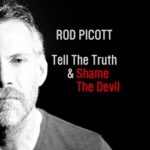 A new Rod Picott album is always something to look forward to. He’s an exceptional songwriter and his voice is a very effective vehicle for delivering those songs. It’s a voice that’s frayed around the edges and at times crackles with emotion. On “Tell the Truth and Shame the Devil”, Rod has stripped his delivery back to just guitar, harmonica and voice; oh, and the songs. Just to give this some context, the album was recorded after a health scare Rod had over the last winter (although not all of the songs are contemporary) and has a stark, sometimes brooding, feel mingled, unsurprisingly, with intimations of mortality, including the opening song “Ghost”, a brutally honest assessment of Rod’s current situation, and that of many others in similar positions. Confessional, hard-hitting singer-songwriter isn’t a particularly lucrative career path these days.
A new Rod Picott album is always something to look forward to. He’s an exceptional songwriter and his voice is a very effective vehicle for delivering those songs. It’s a voice that’s frayed around the edges and at times crackles with emotion. On “Tell the Truth and Shame the Devil”, Rod has stripped his delivery back to just guitar, harmonica and voice; oh, and the songs. Just to give this some context, the album was recorded after a health scare Rod had over the last winter (although not all of the songs are contemporary) and has a stark, sometimes brooding, feel mingled, unsurprisingly, with intimations of mortality, including the opening song “Ghost”, a brutally honest assessment of Rod’s current situation, and that of many others in similar positions. Confessional, hard-hitting singer-songwriter isn’t a particularly lucrative career path these days.
Rod recorded the entire album alone, without an engineer, before handing the tapes over to Neilson Hubbard (you might remember him if you’re a MusicRiot regular) for final production. If you want a benchmark, the finished article has the same feel as The Boss’s “Nebraska” and has similar lyrical themes of family, poverty and alienation. The result of this method is that the songs are stripped to their very essence with no distractions, emphasising the stories they have to tell and, as always with Rod Picott, they’re striking and memorable stories.
As a writer, Rod likes a metaphor; the murder ballad “Too Much Rain” uses a barren landscape to represent the failure of a marriage to blossom, while “Bailing” uses the idea of bailing literally and metaphorically, referring back to a flooded childhood cellar as a metaphor for the futility of activity that only serves to keep us in the same place. Rod also likes to bring a bit of autobiography into the mix; “Mark” is the story of an unexplained teenage suicide, while “Spartan Hotel” is that bar in any town where anything goes if you can pay the price. And don’t forget the social comment; “A Beautiful Light” aims straight the heart of those songwriters who try to glamourise the drudgery of blue-collar life as a means of social control.
This is the third Rod Picott album we’ve reviewed here and they’re consistently powerful pieces of work blending punchy stories of small-time America with haunting melodies in a voice that is both emotive and vulnerable. It’s probably the most personal of his recent albums and well worth a listen.
“Tell the Truth and Shame the Devil” is out now Welding Rod Records and Rod will be touring the UK in October.
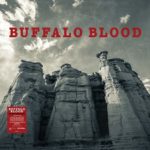 Humour me for a minute. Every so often, a piece of work like this comes along (it’s not just an album it’s a project, maybe even a concept) where every aspect and detail is absolutely perfect. The humouring bit concerns my particular slant on the project. MusicRiot’s gig team, The Riot Squad, are big fans of Dean Owens, the UK representative on the project, so forgive me if I spend a bit of time on Dean’s contribution. It’s fair to say that Dean’s solo material has a strong sense of location; he writes about the area and the people he knows, just like Ian Rankin and Irvine Welsh in their novels and short stories. It’s also fair to say that he’s always been willing to push the boundaries in his collaborations, spreading out into traditional Scottish folk ballads as Redwood Mountain with Amy Geddes, rockier material with his occasional band Deer Lake and his consistently excellent work with Will Kimbrough (more about that later).
Humour me for a minute. Every so often, a piece of work like this comes along (it’s not just an album it’s a project, maybe even a concept) where every aspect and detail is absolutely perfect. The humouring bit concerns my particular slant on the project. MusicRiot’s gig team, The Riot Squad, are big fans of Dean Owens, the UK representative on the project, so forgive me if I spend a bit of time on Dean’s contribution. It’s fair to say that Dean’s solo material has a strong sense of location; he writes about the area and the people he knows, just like Ian Rankin and Irvine Welsh in their novels and short stories. It’s also fair to say that he’s always been willing to push the boundaries in his collaborations, spreading out into traditional Scottish folk ballads as Redwood Mountain with Amy Geddes, rockier material with his occasional band Deer Lake and his consistently excellent work with Will Kimbrough (more about that later).
Buffalo Blood is something else indeed. Dean teamed up with his Nashville friends and collaborators Neilson Hubbard, Audrey Spillman and Joshua Britt, along with sound engineer and photographer Jim DeMain to spend two weeks deep in the New Mexico desert feeling the forces of previous lives played out there while writing and recording fifteen songs that tap into the echoes of centuries of betrayal, exploitation and alienation of the Native American peoples. And it’s not just the songs; there’s video and photography as well. The incredibly ambitious aim of the project is to immerse the listener in five hundred years of Native American experience. What’s truly incredible is that they actually succeeded. “Buffalo Blood” is an album that will entrance you, engage you and enrage you; maybe it will even make you take a serious look at the history of the indigenous peoples of the American continent. That’s what can happen when creative artists follow their instincts and beliefs and just create; I can’t imagine any of the major music providers bankrolling this project, but I believe “Buffalo Blood” has a real shot at commercial success; it’s that powerful.
The songs were recorded live outdoors in the desert, the wind and animal noises contributing to the feeling of immersion in an environment that retains echoes of centuries of struggle. The quality of the songwriting is consistently high across the album as Celtic, European and Native American influences combine to create a perfect musical backdrop for a message that is still relevant (Standing Rock ring any bells?).
The album has a narrative flow; it moves from the original contact with European settlers through time to the closing lament “Vanishing World”, which is perfectly suited to Dean Owens’ plaintive voice. This album is a classic, carrying a very potent message through the medium of haunting melodies and flawless performances; get it on your wishlist.
If you needed the album to be ground-breaking in any more ways, it’s the first UK release on the Eel Pie Records label and it’s available as a vinyl gatefold double album or digitally from Friday February 15 (EPRLP001)
Breaking news – Dean Owens won UK Song of the Year at the UK Americana Awards 2019 for the title track from his 2018 “Southern Wind” collaboration with Will Kimbrough. And that’s not the only good news from the Buffalo Blood camp; Neilson Hubbard produced “Southern Wind” and also Ben Glover’s “Shorebound” (UK Album of the Year winner) and “Rifles and Rosary Beads” for Mary Gauthier, who won International Artist of the Year and is up for a Grammy this year. Not a bad haul, and that’s before “Buffalo Blood” is released.
If you need any more recommendations for Buffalo Blood, try this:
 2018 was a bit of a year, really. There was a strong showing in the first few months of the year and it felt like the early albums would be difficult to beat. Maybe it was a self-fulfilling prophecy or the fact that, for one reason or another, I wasn’t able to review too many albums in the latter part of the year but the early albums were very difficult to beat. I’m only featuring albums that I reviewed here, so great pieces of work like the magnificent Stone Foundation album “Everybody, Anyone” doesn’t get a mention. Oops, it just did. Anyway, as always in no particular order, here are my five favourite albums of the year.
2018 was a bit of a year, really. There was a strong showing in the first few months of the year and it felt like the early albums would be difficult to beat. Maybe it was a self-fulfilling prophecy or the fact that, for one reason or another, I wasn’t able to review too many albums in the latter part of the year but the early albums were very difficult to beat. I’m only featuring albums that I reviewed here, so great pieces of work like the magnificent Stone Foundation album “Everybody, Anyone” doesn’t get a mention. Oops, it just did. Anyway, as always in no particular order, here are my five favourite albums of the year.
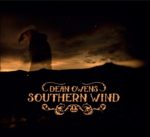 “Southern Wind” – Dean Owens & Will Kimbrough
“Southern Wind” – Dean Owens & Will Kimbrough
I’ve been a fan of Dean Owens since my introduction to “New York Hummingbird” six years ago. Dean’s a consistently great performer whose songs cleverly combine universal themes like love and loss with a particularly Scottish outlook. Over the last few years he’s been increasingly involved in collaborations (with Amy Geddes as Redwood Mountain and the upcoming Buffalo Blood album with Neilson Hubbard and Joshua Britt) and “Southern Wind” was a joint project with the superb and in-demand guitarist Will Kimbrough. The album is a classic; there’s no filler and lots of killer and you can clearly hear the influence of the wonderful Ronnie Lane, particularly in “Last Song”. I wasn’t going to single any particular song out, so how come that just happened. It’s a meeting in the mid-Atlantic between Leith and Nashville and it’s a Thing of Beauty.
 “Psychopastoral” – Phil Burdett
“Psychopastoral” – Phil Burdett
Coincidentally, I first met Phil Burdett on the same night I met Dean for the first time (this stuff isn’t just thrown together, you know) and they’ve both had very different journeys since then. If I had to pick one word for Phil’s attitude to his music, it’s uncompromising, and I mean that in a very, very good way. His back catalogue is all worth checking out, but his latest project “Psychopastoral” is something else. It’s a song cycle which tells the story of the journey home spread out over 24 hours. Sounds simple? This Phil Burdett. The songs are linked by spoken-word interludes and (courtesy of Lyndon ‘Songdog’ Morgan) and musical fragments created mainly by Senor ‘Al’ Franklinos. I know, it sounds like it could be a bit pretentious, as I said, this is Phil Burdett; it works perfectly. And Phil’s gone one step further than Pink Floyd by making the whole project one massive track nearly an hour long to force listeners to hear the project the way it was intended to be heard. Didn’t think I’d ever write a sentence with Phil Burdett and Pink Floyd in it.
 “Out from Under” – Michael McDermott
“Out from Under” – Michael McDermott
We can link this back to Dean Owens as well, because Will Kimbrough plays on this, as he does on a lot of Michael’s recent material. Told you he was in demand. The title song is big in an E Street Band style and, let’s face it, Michael will always get those Springsteen/Dylan comparisons and for all the right reasons. He’s a superb songwriter who understands the American songbook and its highways and byways and isn’t afraid to take a trip down any one of them. The album shifts seamlessly from the pathos of “This World Will Break Your Heart” to the joyful Motown exuberance of “Rubber Band Ring”. I said back in May that I hadn’t heard a better album this year and I stand by that now.
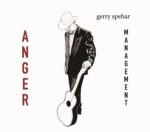 “Anger Management” – Gerry Spehar
“Anger Management” – Gerry Spehar
I loved Gerry Spehar’s previous album “I hold Gravity”. He’s a natural songwriter with a gift for a telling image. So just combine that gift with an exploration of the state of modern America following the election of Kurious Oranj. It’s political in less direct ways as well; “Bitch Heaven” digs into the story of Woody Guthrie’s campaign against Trump Senior and the Beach Haven property, while “Son of an Immigrant” double-underlines the blindingly obvious truth that the vast majority of Americans are immigrants if you go back far enough, including the current occupant of the White House. It’s an angry album, but Gerry is managing the anger by diverting it into creative channels. This is an important album and we should all listen to it.
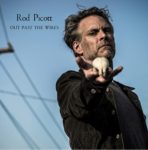 “Out Past the Wires” – Rod Picott
“Out Past the Wires” – Rod Picott
OK, quantity isn’t everything, but Rod Picott defied the current trend for shorter albums and EPs by releasing a double album (twenty-two songs in total). If you have the material and it’s good enough, get it out there. It’s good enough, it’s more than good enough. Will Kimbrough plays on it and also Neilson Hubbard (notice a theme here) but it’s not just about the playing arrangements, it’s also about the stories and that’s what Rod Picott is really good at. In fact, the stories are so important that Rod’s also publishing a book following the lives of some of the characters appearing in the songs and that should really be worth reading.
 Sure, the melodies and the arrangements are important; they must be if Neilson Hubbard and Will Kimbrough are involved, but with Rod Picott, the stories are always front and centre. “Out Past the Wires” is no exception, in fact it takes the narratives a step further. In addition to the album, Rod’s also publishing a book exploring the stories of some of the characters that appear on the album. Listen to the beautifully-crafted vignettes studded through the twenty-two songs (that’s right twenty-two songs; hope you brought a packed lunch for this one) and you feel that you’re just scratching the surface of their lives. The ageing racer in “Primer Gray”, the teen queen in “Hard Luck Baby”, the struggling musician in “Straight Job” and the labourer in “Store Bought”; you really want to know the back story, or where they move on to outside this particular moment. Listen to the album(s) and it all makes perfect sense.
Sure, the melodies and the arrangements are important; they must be if Neilson Hubbard and Will Kimbrough are involved, but with Rod Picott, the stories are always front and centre. “Out Past the Wires” is no exception, in fact it takes the narratives a step further. In addition to the album, Rod’s also publishing a book exploring the stories of some of the characters that appear on the album. Listen to the beautifully-crafted vignettes studded through the twenty-two songs (that’s right twenty-two songs; hope you brought a packed lunch for this one) and you feel that you’re just scratching the surface of their lives. The ageing racer in “Primer Gray”, the teen queen in “Hard Luck Baby”, the struggling musician in “Straight Job” and the labourer in “Store Bought”; you really want to know the back story, or where they move on to outside this particular moment. Listen to the album(s) and it all makes perfect sense.
Credit where it’s due to the other musicians on the album as well (Lex Price, Evan Hutchings and Kris Donegan) for creating settings that allow the songs to sparkle and shine, whether they’re sprinkled with underplayed atmospherics or a full-on, full-band workout. Whether the backing is a gently finger-picked acoustic, intertwined electric guitars, Lennonesque harmonica or a brooding rock feel with heavily-reverbed guitar. And then there’s Rod Picott’s voice, weaving its raw fibres through the fabric of the songs to conjure up passion, pain and even aspiration. He even manages to ease back to mellow with a touch of falsetto on “Blanket of Stars”.
At a time when ten-song albums are becoming increasingly common and EP or double EP is rearing its ugly head, it’s an utterly audacious move to release a double album, but it works. The standard of the songs is uniformly high across he two discs, but I’m going to hit you with a few that caught my personal sweet spot. “Primer Gray” evokes “Nebraska”/”The River” era Springsteen with the battered car symbolising the central character, “Hard Luck Baby” spins the downward spiral from teen beauty into drudgery and “The Shape of You” is a lovely poetic take on the void left in a life when a relationship ends. Listen for yourself; the choice is huge and I won’t be offended if you disagree with my choices.
“Out Past the Wires” is released on Friday February 16th on Welding Rod Records (CD, LP or download).
If you want to see Rod live, he’s touring Europe and the UK from March.
Here’s a little taster for you:
 It’s about time we had a new album from Dean Owens, isn’t it? It’s been two and a half years since “Into the Sea”, not that he’s been resting on his considerable laurels, that’s not his style. He’s been involved in production, collaboration and loads of touring and somehow managed to fit the “Southern Wind” sessions in to the mix. Although the album’s released under Dean’s name, it’s fair to say that it’s more of a collaboration with his guitar-slinger of choice (and mine), Will Kimbrough. The musicians and production team are Dean’s regular Nashville crew and they all do the usual superb job, but the creative thread running through the centre is “Southern Wind” is the Owens/Kimbrough partnership.
It’s about time we had a new album from Dean Owens, isn’t it? It’s been two and a half years since “Into the Sea”, not that he’s been resting on his considerable laurels, that’s not his style. He’s been involved in production, collaboration and loads of touring and somehow managed to fit the “Southern Wind” sessions in to the mix. Although the album’s released under Dean’s name, it’s fair to say that it’s more of a collaboration with his guitar-slinger of choice (and mine), Will Kimbrough. The musicians and production team are Dean’s regular Nashville crew and they all do the usual superb job, but the creative thread running through the centre is “Southern Wind” is the Owens/Kimbrough partnership.
They bonded over, among other things, a mutual love of Ronnie Lane and that’s the starting point for the album. “Last Song”, the album’s opener, wouldn’t feel out of place on any of the Faces albums with its loose rock feel and characteristic melodic basslines. It’s an homage and a tribute and it’s loads of fun; proof that Dean and Will can write an upbeat song (and it’s not the only one on the album).
Although the title track and “No Way Around It” have a slightly menacing Delta feel, “Southern Wind” still has very strong sense of time and place in twenty-first century Scotland and the stories of its inhabitants in difficult social and personal circumstances. “Elvis Was my Brother”, “When the Whisky’s not Enough” and “Bad News” all fit into this category, while “Famous Last Words” is a typical Dean Owens slant on the longest day of the year; that things can only get worse from here on in. Nights are fair drawin’ in, eh? “Anything Helps”, another Will Kimbrough co-write, fits neatly in to this little group with its Ronnie Lane solo era stylings and one of the album’s greatest lines ‘Took a swing at life and missed’.
There’s a place here for the intensely personal as well; the gorgeous “Madeira Street” looks back to more innocent times through a prism of grief and celebration, while “Louisville Lip” celebrates the life of Dean’s hero Muhammad Ali. “Mother” is a light-hearted sixties pastiche (just imagine it on the soundtrack to “Inspector George Gently” or “Call the Midwife”) with clipped guitar and a hint of Phil and Don, while “Love Prevails”, closing the album, channels The Chordettes’ “Born to be With You”, particularly in Will Kimbrough’s laid-back solo.
Dean Owens has that rare poetic ability to fashion perfect songs from life’s everyday stories and the ability to deliver powerful, plaintive performances of those songs. On this album, the partnership with Will Kimbrough and producer Neilson Hubbard has created perfect settings for both the melancholy and the upbeat songs. ”Southern Wind” is a fine piece of work from one of Scotland’s finest songwriters.
“Southern Wind” is released on Friday February 16 on At the Helm Records.
And here’s a special little treat for you:
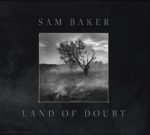 Straight up front, you need to know; this album won’t be for everyone. I have a strong suspicion that this is deep into Marmite territory, that it’s an acquired taste. Texan Sam Baker is one of those songwriters who is revered by his peers (Malcolm Holcombe’s another) who understand the journey he’s on and appreciate the craft involved in his work. One of his aims with “Land of Doubt” is to tell the stories or convey the feelings to his listeners in the most economic way possible without losing any of the nuances. Stripping back music usually involves leaving out instruments that add texture to arrangements, keys, horns, even electric guitar and bass. The approach Sam Baker has taken is to work out the minimum of sounds necessary to create the feeling he wants to evoke and to add nothing extraneous to it.
Straight up front, you need to know; this album won’t be for everyone. I have a strong suspicion that this is deep into Marmite territory, that it’s an acquired taste. Texan Sam Baker is one of those songwriters who is revered by his peers (Malcolm Holcombe’s another) who understand the journey he’s on and appreciate the craft involved in his work. One of his aims with “Land of Doubt” is to tell the stories or convey the feelings to his listeners in the most economic way possible without losing any of the nuances. Stripping back music usually involves leaving out instruments that add texture to arrangements, keys, horns, even electric guitar and bass. The approach Sam Baker has taken is to work out the minimum of sounds necessary to create the feeling he wants to evoke and to add nothing extraneous to it.
The economy isn’t just applied to the instrumentation. The melodies and the rhythms are kept sparse and simple and even the number of words is restricted, a bit like applying the haiku discipline to every aspect of making an album. Producer and drummer Neilson Hubbard, guitar player Will Kimbrough and cool jazz trumpeter Don Mitchell create perfect minimalist arrangements that allow the songs plenty of space; each of the elements is honed to perfection like a setting designed to emphasise a perfect gemstone, but not to overpower. There isn’t a hint of a standard format or template here. Each song gets exactly the instrumentation it needs; nothing more, nothing less. The percussion ranges from the almost non-existent on the country waltz “Love is Patient” to loud drums competing with the vocal on the swampy “Moses in the Reeds” and the military beat of “Some Kind of Blue”, telling the story of a Vietnam veteran who looks back to the war as the happiest time of his life.
At first glance, the track listing seems a little long, but ten songs are interspersed with five instrumental interludes that help to alleviate the sombre mood of the songs while additional colour and texture come in the form of Will Kimbrough’s ambient atmospherics, some piano and harmonium and some deft Chet Baker-style trumpet from Don Mitchell, particularly on “Say the Right Words”, the story of parents who disapprove of their daughter’s choice of partner but are too scared or smart (you decide) to tackle the matter head-on. One of Sam Baker’s strengths is in picking out these little tragedies from the background noise we’re surrounded and showing us the importance they have to the protagonists. It’s not always comfortable, but you can’t stop listening.
As I said at the top of this piece, it won’t be for everyone, but if you like the craft of the songwriter and the arranger, then you won’t be disappointed.
“Land of Doubt” is released on Friday June 16.
![Redwood-Mountain-Side-1-ALT-desat-40[1]](http://musicriot.co.uk/wp-content/uploads/2017/05/Redwood-Mountain-Side-1-ALT-desat-401-150x150.jpg) If everyone was rewarded fairly for talent, creativity and pure hard bloody work, Dean Owens would be a very wealthy man. If the day job is being Dean Owens, singer-songwriter, the part-time jobs include his full band Whisky Hearts, his Deer Lake collaboration with Larry Lean, his Buffalo Blood project with Neilson Hubbard, production duties for Ameripolitan singer-songwriter Ags Connolly and the occasional project featuring covers or, more accurately, interpretations of other people’s songs (Johnny Cash for example). It’s fair to say that he doesn’t have a lot of downtime.
If everyone was rewarded fairly for talent, creativity and pure hard bloody work, Dean Owens would be a very wealthy man. If the day job is being Dean Owens, singer-songwriter, the part-time jobs include his full band Whisky Hearts, his Deer Lake collaboration with Larry Lean, his Buffalo Blood project with Neilson Hubbard, production duties for Ameripolitan singer-songwriter Ags Connolly and the occasional project featuring covers or, more accurately, interpretations of other people’s songs (Johnny Cash for example). It’s fair to say that he doesn’t have a lot of downtime.
With all of those projects simmering away, why not do something else to stave off boredom? So what’s next? What can we cram into that fifteen minutes of the day that’s left? Well, someone gave Dean a copy of Alan Lomax’s “The Book of American Folk Songs” and Dean, having a bit of down time, decided that it would be a great idea to give some of the lyrics new musical settings and record the resulting songs with Whisky Hearts fiddle player Amy Geddes and bass/piano player Kevin McGuire. Although the project was about creating new settings for existing lyrics, Dean and Amy managed to sneak a few of their own compositions, which fit perfectly with the originals. Amy’s “Amang the Braes O Gallowa” has the Celtic authenticity of early American folk tunes, while Dean’s “Take it Easy, but Take it” is a perfect lyrical fit with the Lomax collection. There’s even that very rare beast, a Dean Owens instrumental, “The Two Davies Waltz”. As a creative concept, it works perfectly.
The minimalist arrangement of the songs (two voices, guitar and fiddle, with occasional piano and bass) works perfectly, Amy’s plaintive fiddle reinforcing the melancholy tone of the album while her vocal harmonies lighten the lyrical harshness that play such a large part in these folk ballads. The quality of the album’s so high that it’s difficult to pick favourites, but I loved “On the Range of the Buffalo” and “Rye Whiskey”.
Redwood Mountain is a little gem of an album and it’s out now.


